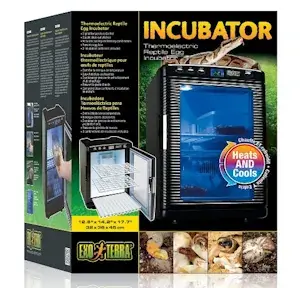Equipment and Accessories for Incubating Reptile Eggs
Incubating reptile eggs is a fascinating process that requires patience, dedication, and the right equipment. It is crucial to do thorough research in advance to create the optimal conditions for the eggs’ development. The right incubator, precise control of temperature and humidity, and the appropriate accessories are essential for a successful hatching process.
Here you’ll find out which equipment and accessories are necessary to successfully incubate reptile eggs—such as those of bearded dragons, leopard geckos, chameleons, or snakes—and ensure the young ones grow up healthy.
1. Incubator for Reptile Eggs
An incubator is the most important device for incubating reptile eggs. It ensures the right temperature and humidity levels required for the eggs to develop properly. Make sure the incubator provides precise temperature control and even air circulation to ensure uniform heat distribution.
Recommended Products:
- Incubator for reptiles (with temperature and humidity control)
- Reptile incubator with automatic turning function
2. Thermometer and Hygrometer
To accurately monitor the temperature and humidity inside your incubator, you’ll need a thermometer and a hygrometer. Reptile eggs require different temperatures and humidity levels depending on the species. Monitoring these parameters is crucial for a successful hatching.
Recommended Products:
- Digital Hygrometer
- Precise thermometer for incubators
3. Hatching Trays or Containers for Eggs
Eggs should be placed in special containers suitable for the incubation period. These trays or containers must be well-ventilated to ensure the eggs receive sufficient oxygen. It is also important to choose a suitable substrate, such as vermiculite or perlite, to regulate moisture levels.
Recommended Products:
- Hatching containers for reptile eggs
- Moisture-retaining substrate (e.g., vermiculite)
4. Lighting and UV Light (After Hatching)
For many reptile species, particularly chameleons and geckos, UV light is essential for their development and growth.
However, during the incubation process, specific UV lighting is not required.
Ensure you have high-quality UVB lamps available after hatching, which are specially suited to the needs of reptiles.
Recommended Products:
- UVB lamp for reptiles (with compatible ballast)
- Lighting unit for incubators
5. Humidifier and Humidity Regulator
Humidity plays an important role when incubating reptile eggs. Some eggs require high humidity levels to avoid drying out, while others prefer a drier environment. A humidifier helps maintain constant humidity, and a humidity regulator ensures that it stays within the desired range.
Recommended Products:
- Humidifier for incubators
- Hygrostat for humidity regulation
6. Egg Turner or Towel Roll
Some reptile eggs, especially those from snakes, need to be turned regularly to support their development and prevent sticking to the eggshell. An automatic egg turner or a towel roll (to manually turn the eggs) is a useful investment.
Recommended Products:
- Egg turner for incubators
- Towel roll for manually turning eggs
7. Hatchling Boxes for Newly Hatched Reptiles
After hatching, the young reptiles need a safe place to develop. Hatchling boxes provide the young reptiles with enough space and a secure environment to thrive during their first weeks of life. Remember to pay attention to the correct temperature, humidity, and lighting for the hatchlings.
Recommended Products:
- Hatchling boxes for reptiles
- Heat sources for hatchling boxes (e.g., heat lamp)
8. Feeding and Care After Hatching
Once the reptiles have hatched, it is important to provide them with the right food and care. Some species require special feeding insects or food to grow healthily. Make sure you prepare the appropriate food and environment for the hatchlings.
Recommended Products:
- Feeding insects (e.g., crickets, flies, etc.)
- Feeding stations and drinking containers for hatchlings
Conclusion
Incubating reptile eggs requires dedication and the right equipment to ensure a successful hatch. With the right tools—from the incubator to hatchling boxes—you can ensure that your reptiles hatch and grow healthily. Remember, each reptile species has its own specific needs, which must be carefully considered to guarantee a happy and healthy life.

